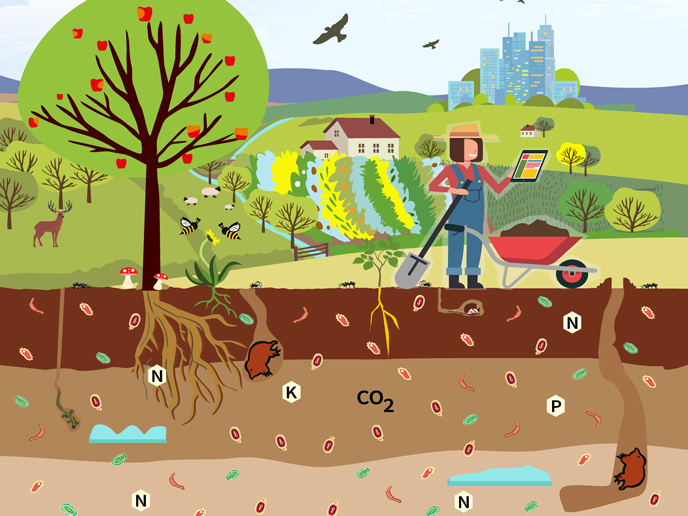Soil health: Reaping the benefits of healthy soils, for food, people, nature and the climate
Life on Earth depends on healthy soil. 95 % of global food production relies on soil. Soil is home to a quarter of all terrestrial species, and it plays a crucial role in nutrient cycling as well as in storing carbon and filtering water, which helps mitigate climate change and prevent flooding and droughts. Yet regardless of soils’ fundamental role in the functioning of our planet’s ecosystems, soils in Europe (and globally) are being degraded which is now starting to have far-reaching consequences, for food security and safety, the integrity of ecosystems and the services they provide to humanity. Urgent action is needed, especially as it takes considerable time to (re)generate soils and restore soil health.
EU policy in the field of soil
A number of current and upcoming EU policy initiatives have soil preservation as an important focus. Healthy soils are essential to meeting the ambitious goals of the European Green Deal and the objectives set by its strategies, in particular the Farm to Fork Strategy and the EU Biodiversity Strategy to 2030. The European Commission is also committed to updating the EU Soil Thematic Strategy in 2021 and setting a common EU framework for action to preserve, protect and restore soil.
Seeding real efforts in soil protection through innovative EU-funded research
Knowledge and tools developed through research and innovation will contribute to preserving healthy soils. For example, recent research has highlighted the function of soils as carbon and nitrogen sinks, thereby supporting the role of agriculture and forestry in the mitigation of greenhouse gas emissions, as well as combating desertification and land degradation. Under Horizon 2020, several topics were dedicated to advancing research efforts in soil health. These efforts will be carried forward under the EU’s new Horizon Europe programme. Horizon Europe will also incorporate new ‘EU missions’, designed to solve major societal challenges facing our world. Five specific missions have been proposed, with one focusing on Soil health and food: ‘Caring for soil is caring for life’. If successfully adopted, this mission will work towards developing real and tangible solutions for restoring soil health and functions, as well as raising general societal awareness of the importance of soils.
Discover the projects making a real difference
The 12 fully featured projects in this Results Pack highlight the synergies between what has already been achieved and how these results can be taken further under Horizon Europe and the proposed EU mission in the area of Soil health and food. In particular, the LANDMARK project developed a framework for soil management to support sustainable European food production and has provided numerous recommendations to policymakers. The CIRCASA project worked to develop international synergies concerning research and knowledge exchange in the field of carbon sequestration in agricultural soils, both in the EU and globally. With farmers and agriculture in mind, the BEST4SOIL project has worked hard to enable farmers to easily access practical information in their own language on how to boost soil health. NUTRIMAN developed an online platform to help farmers comply with new EU regulations on the use of unsustainable fertilisers beyond 2022, informing them of upcoming technologies and solutions that can facilitate the shift to more sustainable biofertilisers. Early career researchers funded under the Marie Skłodowska-Curie Actions programme were also active in soil health research. The AGG-REST-WEB project provided new insights into the relationship between soil biodiversity and functioning, demonstrating that soil food webs can have an impact on soil physical properties which, in turn, determine access to food. The IDESoWa project set out to investigate how increased drainage of soils, due to subsurface drainage installation, changes the mineral composition of soils and consequently affects organic matter and nutrient cycling. Finally, with an emphasis on exciting frontier research, the European Research Council (ERC) project DormantMicrobes explored how soil microorganisms are able to generate energy, fortify their cells for protection and utilise limited, short pulses of water, all in order to survive in varied, and sometimes harsh, soil environments.



